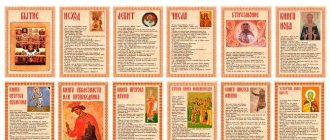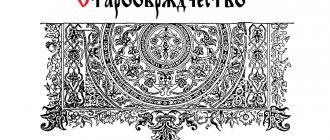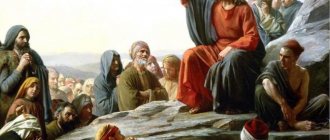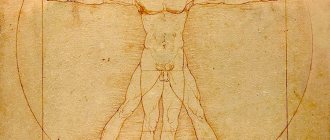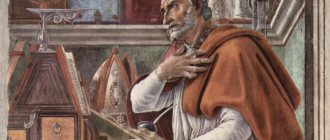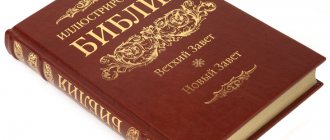Summary
Being
The Old Testament begins with Genesis, the plot of which tells about the creation of the human world. So God created the present world in just six days, starting with the earth and heaven and ending with people and other reptiles. After hard work, he decided to rest. This rule forms the basis of holidays today. The Lord was pleased with his creation.
Also in Genesis, Adam and Eve meet the serpent in the Garden of Eden. The first people were ready to break the Law of God for the sake of sweet luxury. By this action they anger their Creator.
The desert world begins to fill up. The morals of the new inhabitants are deteriorating. The Lord is running out of patience.
The Great Flood occurs. He was called to wipe away all sins. At this time, Noah builds a ship, collecting 7 pairs of each pure creature, and 2 pairs of non-clean ones.
Everything starts again. The creator promises not to carry out such cleansing activities anymore. The new population also has a mean spirit, their minds are frivolous.
Many have heard, but not everyone knows the details of Judas’ betrayal.
Abraham and Sarah
Next comes the story about the Lord’s new favorites - Abraham and his wife Sarah. After a long time, the child Isaac appears. The child was the meaning of life for the parents.
However, God tries to test Abraham's faith and asks him to kill his son. The father agrees. At the last moment before the murder, the Lord allows the baby to be replaced with a ram.
The main idea conveyed by this part is that only a true believer is capable of sacrificing his most sacred things. Time passes, Isaac marries the girl Rebekah. They have two sons. God gives one of them the name Israel. From his twelve children begins the origin of the Jewish people.
Along with this time, the liquidation of Sodom and Gomorrah is told.
The End of Genesis
Genesis ends with the Jews coming to Egypt. There the sons of Jacob sell their brother into slavery. After the death of the ruler, another pharaoh comes.
Life for Jews is becoming difficult. During this period, Moses comes and begins to create disturbances. The Jews spoiled the water, killed the livestock, took the wealth and left the land.
Desert
Then the wanderings in the desert begin, lasting forty years. Moses' main task was to bring his people to Israel. Before reaching him, Moses dies.
Jesus comes. After reaching the new land, the Lord took pity, deciding that the Jews had suffered greatly. A war begins for the best conditions.
Every opponent of Jesus was defeated. He did not take his opponents prisoner. Then for 400 years the Creator either punishes Israel or releases it from torment. The Jews live under the rule of God and temporary rulers. One of them was Solomon.
Kingdom of Israel
The Jews decide to appoint a ruler. The choice falls on the monk Saul. Then his son David comes to the throne. In his youth, he successfully wins the battle with Goliath. He was a good king.
He carried out a large number of reforms and made Jerusalem the capital of the Jews. The Lord's trust was lost after David sinned with a girl who was married. This person remains important in the Old Testament.
Division of Israel
After Solomon's reign ended, the king of Babylon, Nebuchadnezzar, came.
He took the entire Jewish people into slavery. After which, they began to pray to the Lord. Seven years later, he took pity and sent the Persians to defeat the Babylonian king. Ezra, the founder of Judaism, appears.
Prophets of the Two Kingdoms
The Bible talks about great people who made predictions about the future. They were called prophets. The Jewish people believed that the main ones were Daniel and Isaiah, Israel, Elisha. The Old Testament ends with their story.
Law as a teacher
Mercy and truth will meet, truth and peace will kiss
- we read these words in the Psalter (Ps
84:11
). This is a good reflection of the very essence of the Old Testament. Since ancient times, its interpreters have emphasized that it combines two principles: mercy and justice. They necessarily complement each other; mercy without justice degenerates into connivance with evil, and justice without mercy degenerates into merciless vindictiveness.
Therefore, the Old Testament first affirms the Law, certain rules of behavior and punishment for their violation - but also proclaims mercy for the sinner who violates this Law. Even in Old Testament times, the Jews stated the essence of the Law very briefly: “Love God and your neighbor, and everything else is just a commentary.” Indeed, one part of the Law detailed the rules of worship, and the other set out the rules that people had to adhere to in their relations with each other.
In themselves, these rules may seem archaic and petty to us - people of the modern world, but in that era no one thought so. When they began to translate the Bible into the language of an African tribe, its representatives, who had already converted to Christianity, were asked where to start. Of course, the expected answer was “from the Gospel” or, at least, “from Genesis,” but the converts were interested primarily in Leviticus, a most boring book, from our point of view, which listed all sorts of ritual institutions. The tribe was accustomed to living in a world where religious regulations (all kinds of taboos) play a huge role, and a new faith for them meant, first of all, a new system of taboos.
The Old Testament rules were not at all random or meaningless. For example, the Lord commanded the Israelites to perform circumcision as a sign of their belonging to God, a sign of the covenant made between Him and His people. And only when the Israelites became accustomed to this sign and began to disparagingly call their neighbors “uncircumcised” did the words of the prophet become possible: Behold, the days are coming, says the Lord, when I will visit all the circumcised and the uncircumcised: Egypt and Judah, and Edom and the sons of Ammon, and Moab and all those who cut the hair of the temples, who dwell in the wilderness; For all these nations are uncircumcised, and all the house of Israel is uncircumcised in heart
(Jer
9
:25-26; Deacon Stephen refers to this passage in Acts
7:51
). What does "circumcised heart" mean? Of course, we are not talking about cardiac surgery, but about a person dedicating not part of his body to God, but all his thoughts and feelings.
And later - the words of the Apostle Paul, abolishing this custom for Christians: Circumcision is useful if you fulfill the law; and if you are a transgressor of the law, then your circumcision has become uncircumcision. So, if an uncircumcised man keeps the statutes of the law, will not his uncircumcision be counted against him as circumcision? (Rom 2:25-26). That is, if you act according to the will of God, you do not need any additional signs, and if not, they will not help you. But if the Apostle Paul had addressed the people of Abraham’s time in this way, they would have heard in them only complete indifference, disregard for God’s commandment. To become an exception, you must first master the rule.
Likewise, the chosen people, in order to come to New Testament freedom, had to go through a kind of school of the Law, learn both mercy and truth; It is no coincidence that the same Paul called the Law a teacher to Christ (Gal 3:24-25), that is, he compared it with a slave who took a child to school and picked him up from it (in Greek it was he who was called “teacher”). Christ had to teach all the most important things, but it was still necessary to reach His school.
How many books are there in the Old Testament? Structure and authors
The Old Testament includes the first 39 books of the Bible. They were written by different authors over many centuries.
The structure of this collection can be presented as follows:
- Pentateuch of Moses. This part describes the origin of the world, the campaigns of the Jews to the Promised Land. Basic religious rules are also formed.
- The books of Jesus, Judges, and Kings tell the story of the death of Moses and life after him until the coming of the king of Babylon.
- Prophets and their books. The part about predictions.
- Sermons are scattered throughout the Old Testament without any specific position. They are not combined into one section. These include the Psalter and the book of Job.
Steps to heaven
God was preparing humanity for the coming of Christ long before it took place. The experience of missionaries who worked among the wild tribes of Oceania shows: until the ideas about the One God and the law given by Him are assimilated, it is useless to preach the Gospel. Is it possible to talk about love for one’s neighbor with cannibals who love their neighbors so much that they lick their fingers?
However, even without cannibalism, monstrous things happen in such tribes. I personally had the opportunity to talk with a man who spent twenty years in Papua New Guinea. He said that the “cult of cargo” flourished there (from the English cargo “cargo”). The Papuans saw the highest value in material objects brought by white people and understood the preaching of Christ through the prism of this cult. Having heard, for example, that whoever follows Christ will receive in the future life a hundred times more than he gave in this life, one tribe chose a volunteer, crucified him on the cross (!), and put tools, clothes and other supplies in the grave so that, when the crucified one is resurrected, instead of one ax, you will receive a hundred at once.
There is no doubt that if it were not for the long centuries of “preparation for the Gospel,” as early Christian writers called this process, no other attitude towards the preaching of Christ could be expected. Of course, this preparation also included the preaching of pagan sages, philosophers and teachers, who instilled in their listeners ideas of goodness, justice and mercy, but the Old Testament still played the main role in it.
In the book of Genesis we encounter an amazing image: Jacob dreams of a ladder along which angels descended from heaven to earth and ascended back (Genesis 28:12). In a sense, the Old Testament is the same ladder along which, even before the incarnation of Christ, the messengers of God’s will descended to people so that they could take their eyes off the earth and reach for something higher.
In the end, we simply will not understand almost anything in the New Testament if we do not turn to the Old. Its main event is the sacrifice of Christ on the cross. But what is a sacrifice? Why is it needed? Who brings it and for what reason? All this can only be understood from the Old Testament.
After all, humanity really was not at all like it is now. Reading not only the Old Testament, but also other texts of that time, we see that the commandment “thou shalt not kill” sounded in a world where killing your personal enemies and in general anyone you didn’t like was considered not only normal, but very commendable and “ cool." Therefore, the Old Testament is a ladder along which humanity (primarily the chosen people, Israel) ascended to the level at which it could accept the Gospel message. And the Law played the main role in this.
The Challenges of Bible Study
Hundreds of years ago, the Bible was inaccessible to ordinary people; it was read and copied only in monasteries. In studying sacred texts, ordinary people could only rely on the words of clergy, often taken out of context, embellished and even distorted.
Now anyone can familiarize themselves with the main book of Christianity and form their own opinion about it, without relying on retellings. You can buy a leather-bound Bible in the store - https://www.visson.net/category/magazin/biblii-v-kozhanoy-oblozhke.
It is rarely read in the original, especially since there are translations into almost all living languages. Translations are the cause of many theological disputes. In the process of repeated translations, the original meaning of the chapters of Scripture could be lost or changed.
As you read the Bible, you will repeatedly come across controversial passages, be confused, wonder, not understand, and ask questions . There are especially many such moments in the first books, which describe ancient times from the creation of the world. Interpreters of the book tend to explain the inconsistencies with religious metaphors and are convinced that they should not be taken literally.
The Bible, among other things, is filled with repetitions and detailed genealogies, sometimes occupying entire pages . Duplicate passages can be explained by the large number of authors and compilers working on the book. The family trees of the patriarchs are probably important to theologians and theologians, but are unlikely to provide much useful information or food for thought to ordinary readers.
One of the most famous biblical scholars, the American Neil Pryor, has compiled wonderful brief retellings of the Testaments, preserving the meaning intended by the authors, but not burdened with detailed details. It should, however, be remembered that the doctor of theology fully supports the official Christian concept and interprets all biblical “metaphors” in accordance with it.
You should definitely read about the Great Canon of Andrew of Crete.
Teaching books
The Book of Job The name of the book and the main subject of its content The time of Job's life The writer of the book The purpose of writing the book of Job The main subjects of teaching in the book of Job The doctrine of man The doctrine of the Redeemer and the future resurrection The transformative and moralizing meaning of Job The Psalter Explanation of the name of the book Writers of the psalms Inscriptions on the psalms Division of the psalms according to content The use of psalms during worship and in private life in ancient times among the Jews and in the Christian Church Psalm II Psalm VIII Psalm XV Summary of content Psalm XXI Reason for writing the psalm Psalm LXVIII Psalm XXIII Psalm XLIV Psalm CIX Summary of content Psalm CXVII Summary of the contents of the Book of Proverbs Title of the book Summary of the contents of the book of Proverbs Information about the writer of the book of Proverbs Liturgical use of Proverbs in the Orthodox Church Chapter I, 20–33 art. Chapter VIII, 20–23 art. Chapter IX Book of Ecclesiastes Name of the book Writer and purpose of writing the book Statement of the contents of the book The main subjects of teaching in the book of Ecclesiastes The relationship of educational books to legal and historical ones
Legal books
Book of Genesis Time, place, main subject and purpose of writing the book of Genesis Chapter II Chapter III Chapter IX Chapter XII, Art. 1–9. The Calling of Abraham and God's First Promises to Him Chapter XIII, Art. 14–18. The third appearance of God to Abraham Chapter XIV, 14-24. The Captivity of Lot and the Blessing of Abraham by Melchizedek Chapter XV, Art. 1–18. The Fourth Epiphany to Abraham and God's Covenant with Abraham The Rite of Circumcision Chapter XXII, Art. 1–19. The Eighth Epiphany to Abraham, the Sacrifice of Isaac and the Renewal of All Previous Promises Chapter XXVIII, Art. 10–22. The first epiphany to Jacob in a vision of a mysterious ladder Chapter XLIX, 10 v. Jacob's prophetic blessing to his sons Book of Exodus The main subject of the book and a summary of its contents Chapter XII, Art. 1–27. Law on Easter Chapter XIII, Art. 1–6. Law on the dedication of the firstborn to God Chapter XIV, 11–32 art. The passage of the Jews through the Red Sea Chapter XIX. Preparation of the Jews for the Sinai legislation Chapter XX-I. Sinai legislation Chapter XXIV, 3–8 art. The solemn entry of the chosen people of God into a covenant with God Description of the structure of the tabernacle of meeting The book of Leviticus The main subject of the book The concept of the Old Testament sacrifices (I-VII chapters) The Old Testament priesthood Chapter XXIII. Laws on holidays Sabbath year and jubilee year The meaning of Levitical service, as explained by St. Apostle Paul in his letter to the Hebrews Book of Numbers Name of the book and its place Chapter VI. Review of the Nazirite and the words of priestly blessing Chapter XVII. Confirmation of the priesthood for the clan of Aaron by the miracle of his rod becoming frozen Chapter XXI. Copper serpent Prophecy of Balaam (XXII-XXIV ch.) Deuteronomy Time and place of its writing

